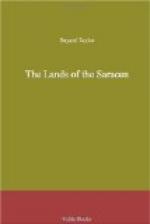The burnt quarter has since been rebuilt, and I noticed several Christians occupying shops in various parts of it. But many families, who fled at the time, still remain in various parts of Syria, afraid to return to their homes. The Aneyzehs and other Desert tribes have latterly become more daring than ever. Even in the immediate neighborhood of the city, the inhabitants are so fearful of them that all the grain is brought up to the very walls to be threshed. The burying-grounds on both sides are now turned into threshing-floors, and all day long the Turkish peasants drive their heavy sleds around among the tomb-stones.
On the second day after our arrival, we paid a visit to Osman Pasha, Governor of the City and Province of Aleppo. We went in state, accompanied by the Consul, with two janissaries in front, bearing silver maces, and a dragoman behind. The serai, or palace, is a large, plain wooden building, and a group of soldiers about the door, with a shabby carriage in the court, were the only tokens of its character. We were ushered at once into the presence of the Pasha, who is a man of about seventy years, with a good-humored, though shrewd face. He was quite cordial in his manners, complimenting us on our Turkish costume, and vaunting his skill in physiognomy, which at once revealed to him that we belonged to the highest class of American nobility. In fact, in the firman which he has since sent us, we are mentioned as “nobles.” He invited us to pass a day or two with him, saying that he should derive much benefit from our superior knowledge. We replied that such an intercourse could only benefit ourselves, as his greater experience, and the distinguished wisdom which had made his name long since familiar to our ears, precluded the hope of our being of any service to him. After half an hour’s stay, during which we were regaled with jewelled pipes, exquisite Mocha coffee, and sherbet breathing of the gardens of Guelistan, we took our leave.




